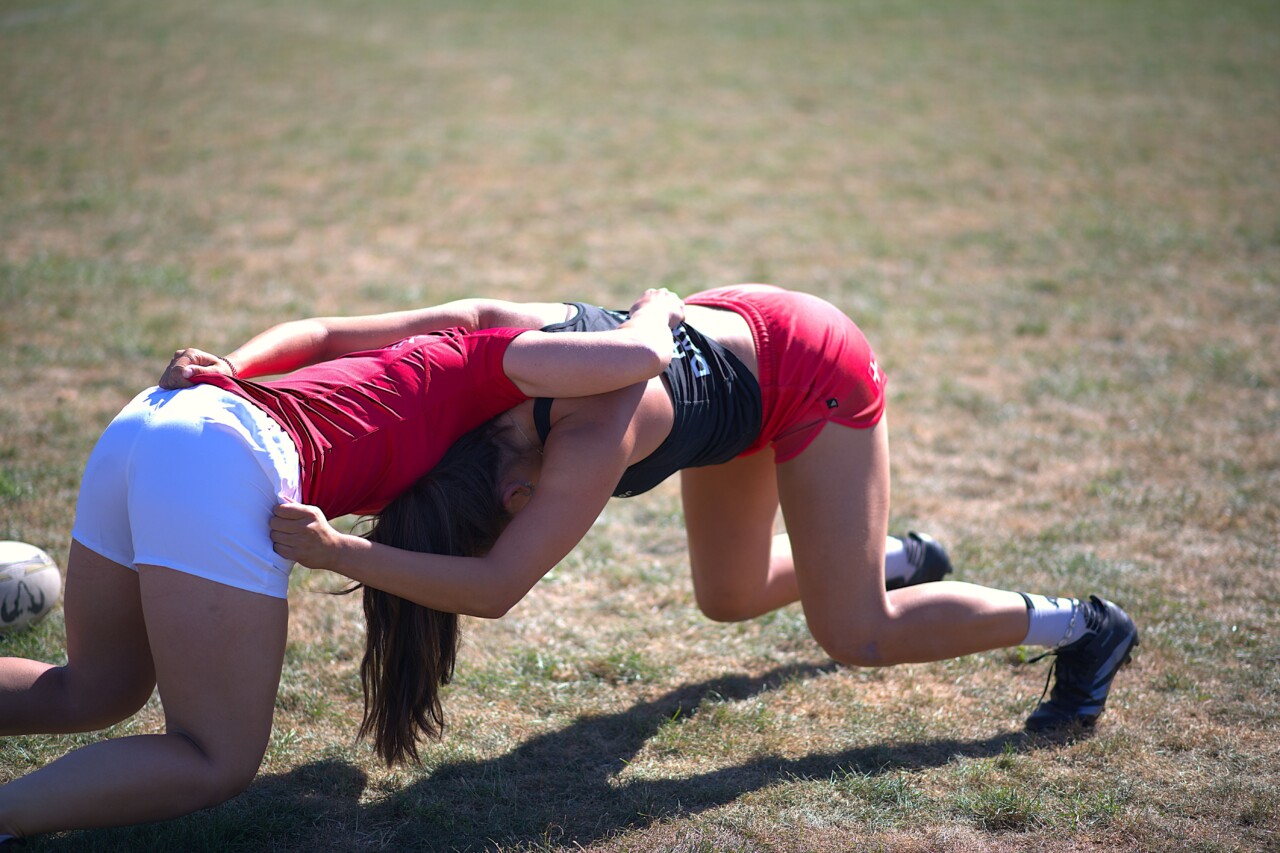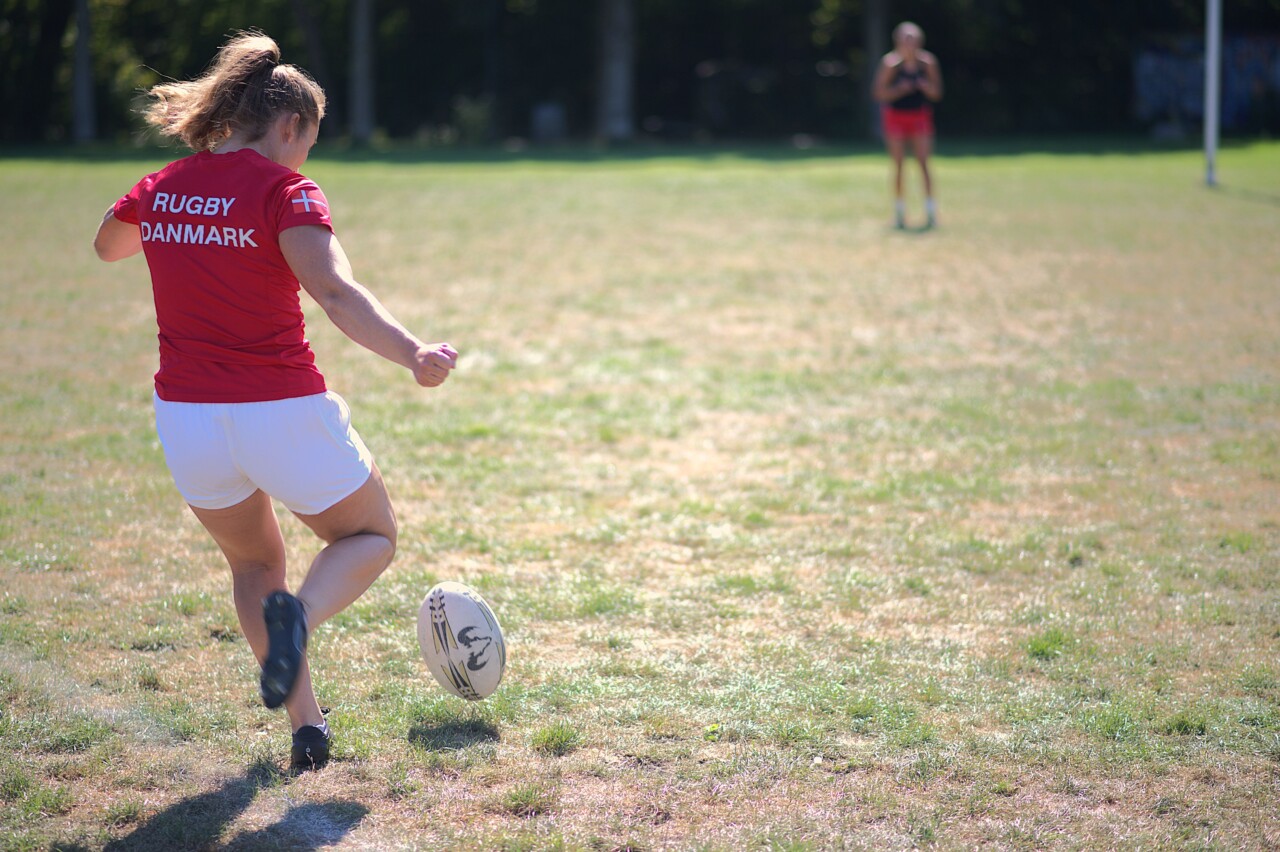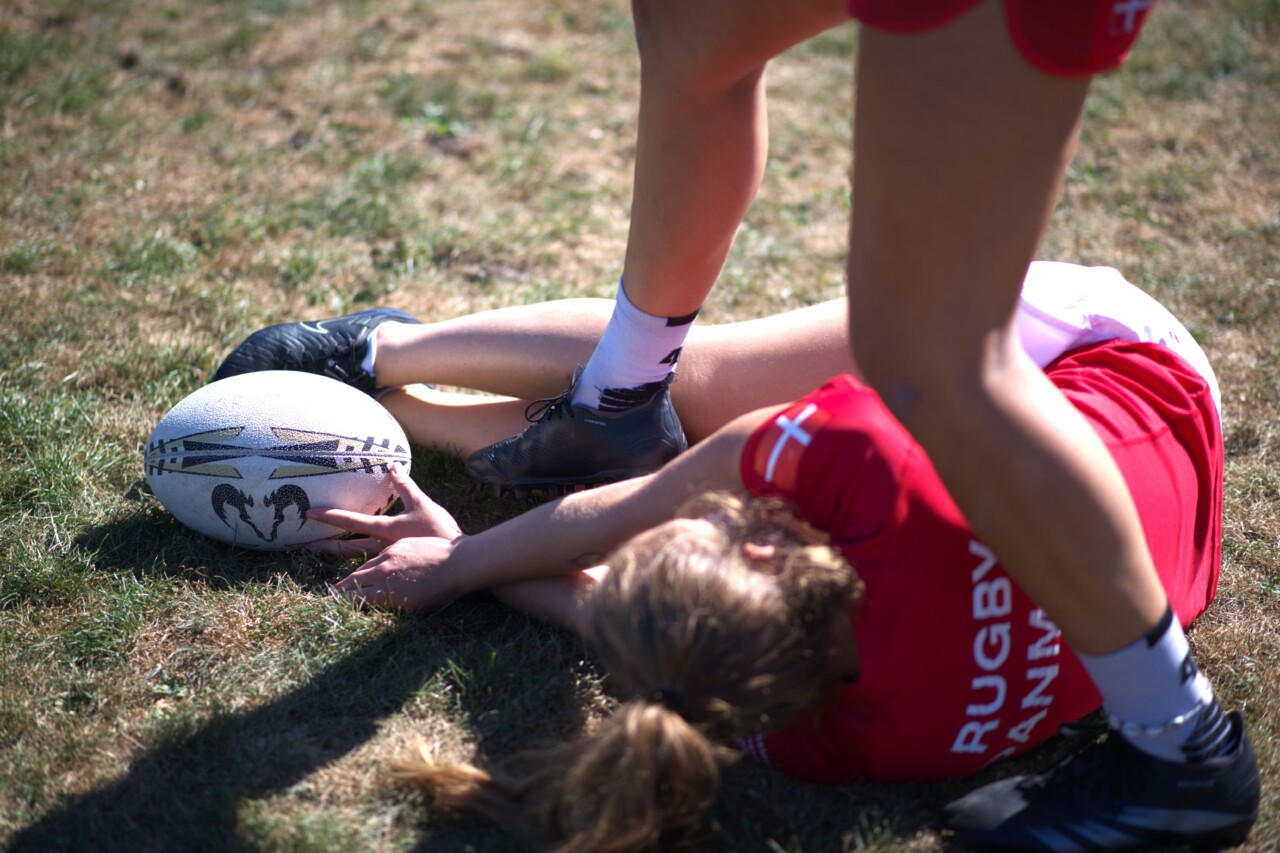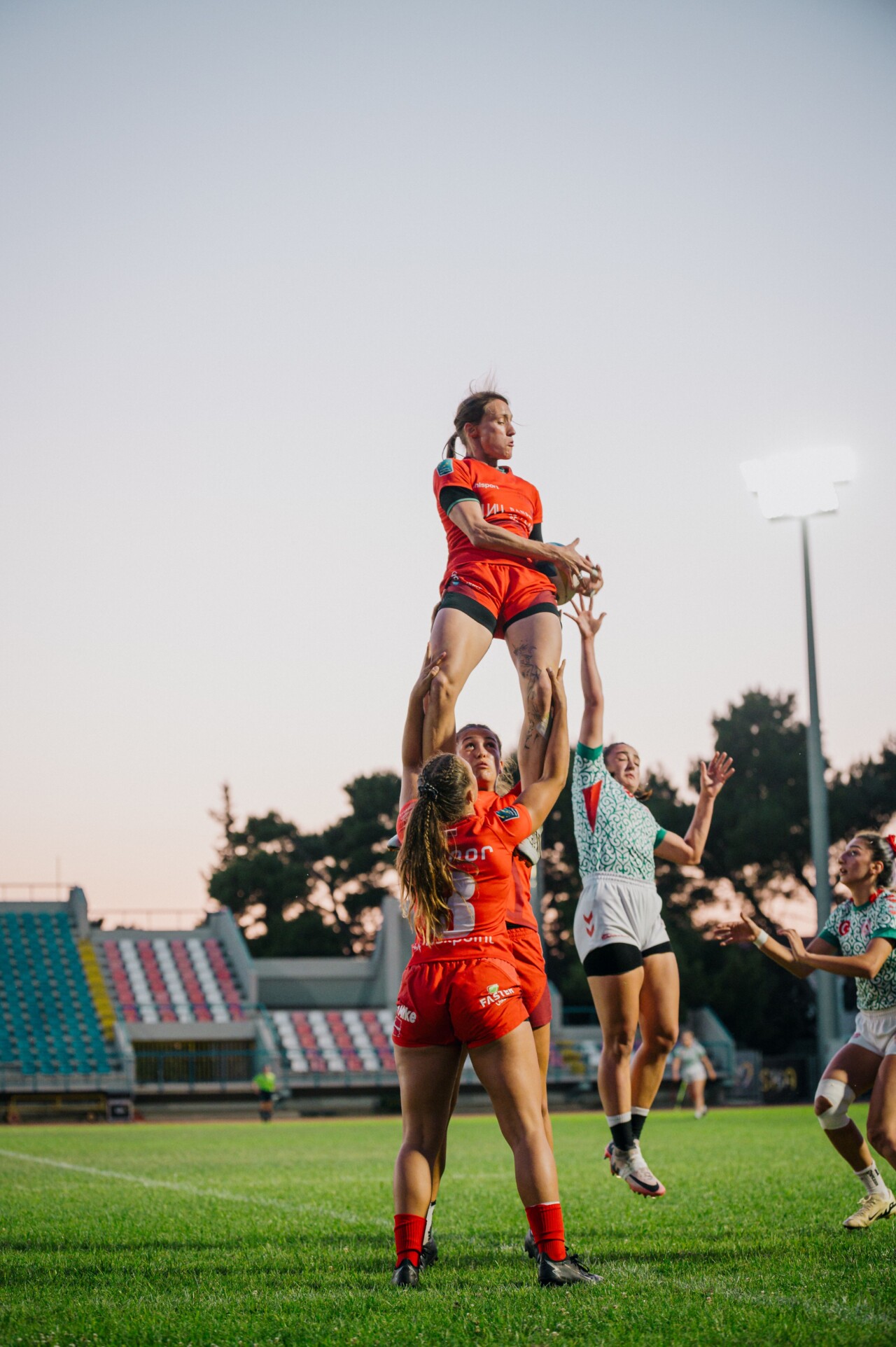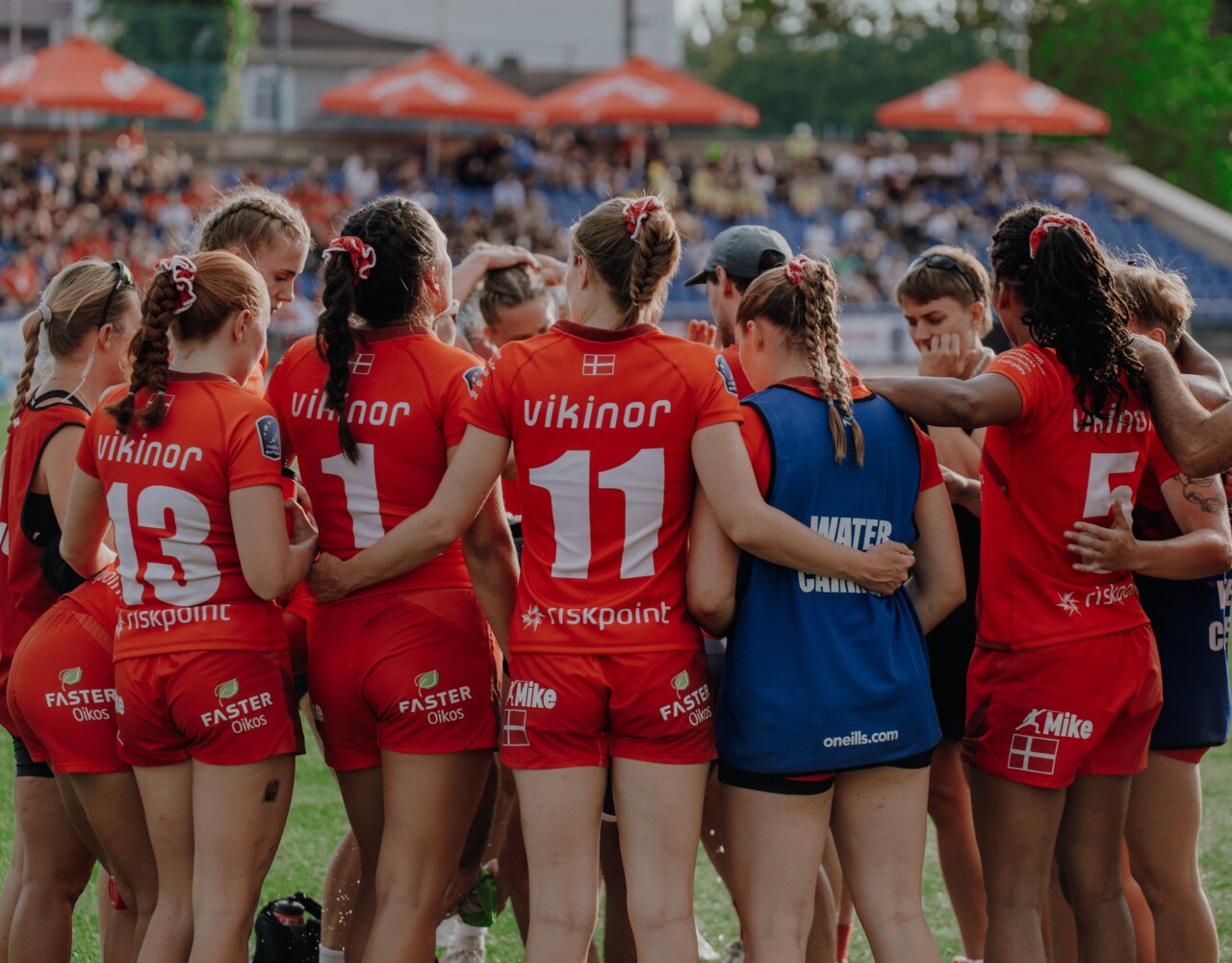Universitetsavisen
Nørregade 10
1165 København K
Tlf: 35 32 28 98 (mon-thurs)
E-mail: uni-avis@adm.ku.dk
—
Student life
Top of Europe — Two powerhouse UCPH students made rugby history with silver for Denmark. We met them to talk competition, bodies, and the brutal balancing act between university life and niche sport.
»It sends a shiver down my spine when you talk about it.«
Kinza Olsen Riahi is sitting with Malou Krøll Sebens, and is describing that particular day when two University of Copenhagen (UCPH) students were a part of a Danish rugby sensation.
With a silver medal at this year’s European Championship in the second-best division, Denmark’s national women’s team didn’t just make it to the podium. Their win promoted them to the top European rugby league — the Championship division — something no Danish rugby team, male or female, has ever achieved before.
The two women don’t just have physical training in their schedules. They are not only top-level athletes, they are full-time students at UCPH.
The University Post met up with them to find out how they manage a dual career in sports and academia — and what kinds of compromises it requires.
Malou Krøll Sebens has just submitted her bachelor’s thesis in medicine, while Kinza Olsen Riahi is starting her fifth semester in political science.
At university, Malou Krøll Sebens is known as »the one with the big backpack« as she lugs around a traveller’s pack big enough to fit her study materials, workout clothes for the whole day, and what she calls »the world’s biggest packed lunch«.
When she is asked to recount the schedule for a typical day, it makes you breathless. »At 6:45 am I show up at Bispebjerg Hospital, where I work as a blood sample technician. Before that I’ve already done a morning workout, and after my hospital shift I head straight to university to be ready for a 10:00 lecture. At 5:30 pm I leave Panum and go to my club for two hours of training, and I’m usually home again by around nine«.
It may not be a student job, but it still gives you some really valuable skills.
Kinza Olsen Riahi
Kinza Olsen Riahi has had to do without a student job — something that can be hard for her to accept when she compares herself to her peers:
»Damn, all my classmates have these great student jobs — and what do I have?« she says, adding that she hopes her subject, political science, and her sport can one day be combined with her interest in diplomacy.
She appreciates the flexibility of her study programme, a supportive study group, and a weekly day off this semester that helps her pull it all together again:
»When we train two to three hours a day and every weekend is packed with full-day tournaments or training, I haven’t had time to recharge, read ahead, do laundry, shop — any of it. Mondays are when I catch up on all that,« says Kinza Olsen Riahi.
As we write this article, the university is abuzz with new students being led around campus by enthusiastic tutor groups. If her sport didn’t take up so many hours of the day, Kinza Olsen Riahi says she would have loved to be a tutor too.
»It’s really important for me to be social, and I try to make time to show up for the Thursday bars after training,« she says. She also had to skip her department’s formal ball because of a rugby event.
READ ALSO: Student of social sciences: »I honestly wish I had 48 hours in a day«
It’s frustrating to have to compromise on the studying and the education programme. On this, the two athletes are in agreement. Neither of them sees their studies as a plan B in case their sports careers don’t work out. They hope to excel as much with their books as on the rugby field.
But it isn’t always easy to pursue two big dreams at the same time:
»If you want to compete in sport at a high level, you need to be a perfectionist and give it everything you’ve got. But it’s hard to perform well both in your studies and in your sport. So I really have to fight to believe it when I tell myself it’s okay to fail an exam,« says Malou Krøll Sebens, who also often misses birthdays and parties.
Neither Malou Krøll Sebens nor Kinza Olsen Riahi are a part of the UCPH support scheme for elite athletes, KU Professionals, which is run in collaboration with the national support organisation Team Denmark.
Suddenly I felt like I belonged, instead of feeling wrong for being broad-shouldered and muscular.
Malou Krøll Sebens
Rugby is too small a sport to be affiliated with Team Denmark, something that Kinza Olsen Riahi says is »a real shame.«
And Malou Krøll Sebens had already been at university for nearly three years before she even heard about the UCPH scheme, which she now plans to look into during her master’s degree. Whether it’s even possible to join without Team Denmark’s backing is still uncertain.
With visits to eight different countries in the past eleven weeks in service of rugby, she’s worried about how the compulsory clinical placements in her master’s programme might affect her coming year on the rugby field.
»It’s not that UCPH in any way obstructs the combination of studies and elite sports,« says Malou Krøll Sebens:
»But more transparency and information about the opportunities UCPH students actually have would be really helpful,« she says.
The Danish women’s national team now has a more professional setup — but this has not always been the case.
Last year’s European Championships came with a personal cost of around DKK 4,500 for each player — a sum that had to be paid on top of all the other expenses already stretching a tight student budget.
READ ALSO: Save more, live more: Student budget hacks for Copenhagen
There is financial disparity between the men’s and the women’s games: Men are sometimes paid to join invitational teams abroad, »while we have to pay for our own plane tickets,« says Kinza Olsen Riahi.
Part of the national team ‘job description’ involves putting in extra volunteer hours — finding sponsors just to be able to take part in major tournaments.
»It’s really only in the past two years that we’ve managed to get enough funding to train and commit the hours it takes to perform at the same level as the biggest rugby nations,« says Malou Krøll Sebens, pointing to the support team now behind them — including a manager, a strength and conditioning coach, and physiotherapists.
READ ALSO: The power of numbers: Woman, know your stats
The European Championship tournament
There are three divisions, from lowest to highest level: Conference, Trophy, and Championship.
The format is Sevens, with seven players on the field, five substitutes, and one reserve.
Each match lasts two halves of seven minutes with a one-minute break in between, and six matches are played over three days.
The tournament consists of two rounds. Final rankings determine podium placements, and the top two teams are promoted to the next division.
There are currently about 2,500 active rugby players in Denmark — by comparison, soccer had nearly 375,000 registered members in 2024.
The two silver medallists agree that the ideal scenario would be to focus solely on the sport and not all the logistics surrounding it. But they are quick to see the bright side:
»That’s part of the charm of playing a niche sport — we all have to pitch in together,« says Kinza Olsen Riahi.
And when asked what the absolute best part of rugby is, they both chime in: »The community!«
»We enter the pitch as one. I can’t do anything if the others aren’t with me — we’re all connected on the grass,« says Kinza Olsen Riahi, and Malou Krøll Sebens adds that they forge lifelong friendships — even across national borders.
And Kinza Olsen Riahi points out that the volunteer work isn’t in vain either:
»It may not be a student job, but you gain some really great skills from it — learning to organise, take responsibility, and communicate.«
READ ALSO: Young, brilliant, and tired of being underestimated
Kinza Olsen Riahi’s own path to rugby comes from primary school, and the promise of a school trip to London. If pupils showed up and joined training, they were allowed to take part in a school rugby tournament in the heart of the great English rugby nation. The trip ended up being cancelled — but by then, a spark had already been lit in Kinza. Now, after ten years in sweaty rugby gear, she’s still fired up.
For Malou Krøll Sebens, it all began with an exchange trip to the US, where she was the only woman out of 40 players on an American-style football team.
»It was both an awesome and a tough experience,« she says. When she came home, a neighbour dragged her along to rugby training.
»Suddenly I found myself surrounded by loads of really cool women — and I loved it,« she says, adding that meeting female rugby players challenged certain gender norms:
»These were women using their bodies in a sport that’s typically seen as being for men. And they could still be feminine and wear dresses off the field. Then these badass women would step out onto the grass and show how it’s done. All of a sudden, I felt like I belonged instead of feeling wrong for being broad-shouldered and muscular,« says Malou Krøll Sebens.
That’s part of the charm of playing a small niche sport — we all have to pull together.
All body types are welcome — and celebrated — in rugby. One particular episode from this year’s European Championship clearly shows the female athletes’ relaxed relationship with their bodies:
All players had to be weighed before and after both breakfast and matches to monitor how much fluid they were losing, as the temperature hit 35 degrees Celsius. If anyone didn’t want to do it, that was respected — but it was never an issue, says Malou Krøll Sebens:
»There’s no shame in weighing 80 or 85 kilos — it almost turned into a competition over who could eat the most at the breakfast buffet,« she says.
Kinza Olsen Riahi adds that the men’s coach dropped by during the final days and pointed out that the weighing could be problematic and borderline body shaming.
»That’s a total misunderstanding. It’s incredibly important for us to track. If I’ve lost more than a kilo after a match, I seriously need to go hydrate so I don’t lose performance before the next game,« she says.
The pressure to perform is only going to increase in the near future. Turkey snatched the gold right in front of Denmark at this year’s European Championship, so when the Danish national women’s team gets their chance for revenge in the Championship division, they are motivated:
»We don’t want to get relegated,« says Malou Krøll Sebens, and adds:
»It will be Turkey that goes down — when we beat them.«
This article was first written in Danish and published on 1 September 2025. It has been translated into English and post-edited by Mike Young.
